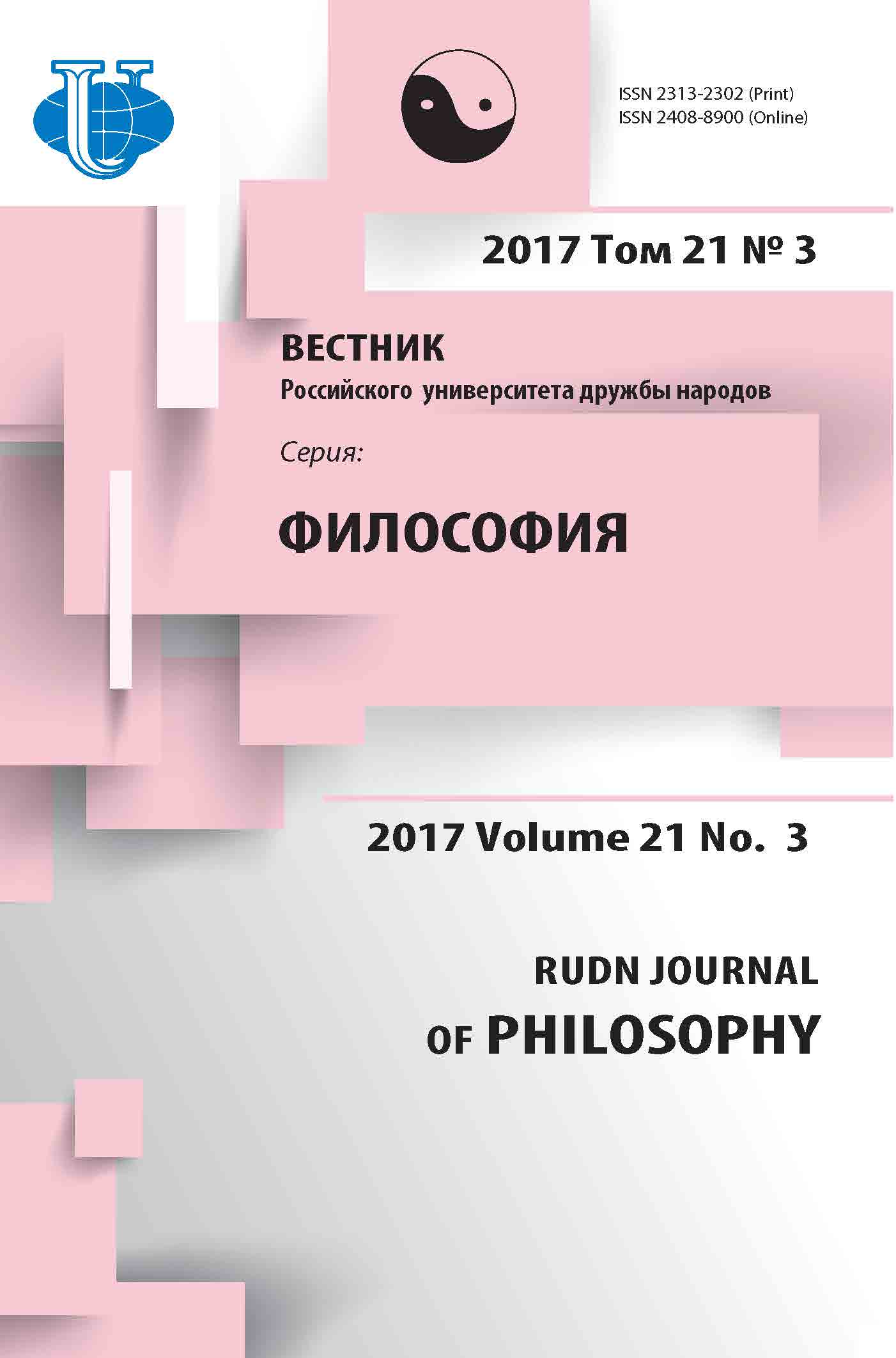MORAL CHOICE AS THE BASIS FOR UNDERSTANDING MORALITY (regarding ideas of S. Kierkegaard and F. Nietzsche)
- Authors: Kosorukova AA1
-
Affiliations:
- RUDN University (Peoples’ Friendship University of Russia)
- Issue: Vol 21, No 3 (2017)
- Pages: 323-329
- Section: Articles
- URL: https://journals.rudn.ru/philosophy/article/view/16979
- DOI: https://doi.org/10.22363/2313-2302-2017-21-3-323-329
- ID: 16979
Cite item
Full Text
Abstract
The article considers two ways of raising the question about the concept of moral choice, carried out by two famous critics of the classical intellectualism in ethics - S. Kierkegaard and F. Nietzsche. The work defines the main contexts for the understanding of moral choice: as associated with the ideas of the overcoming of the abstract nature of the subject of moral choice, as making the emphasis on per-sonality and as based on the idea of increasing self-affirmation of life in opposition to the values of denial of life (Ressentment). The philosophy of Kierkegaard illuminates the theme of moral choice from two points of view: as a phenomenon of the ethical stage of existence, and as characteristic of the religious stage. If the ethical stage defines the moral choice as associated with the choice of these or those moral values, the religious stage is raised from the choice between the Absolute and the items of temporary individual human existence. The position of Nietzsche in relation to understanding the nature of morality is associated with his separation of morality of masters and morality of slaves. If the latter is determined by the sense of Ressentiment, the first is understood through absence of the sense of Ressentiment, and the positing of values “from the” advanced will to power. Resentment is treated in the article in the sense, in which it is defined by Nietzsche in “Genealogy of morality” - as the sense of smoldering resentment at your own weakness and someone else’s strength. The article emphasizes the parallelism between the theme of personal moral/ religious choice in Kierkegaard and the theme of individual autoreflexion struggle with Ressentment as the basis of morality in the view of Nietzsche.
Keywords
About the authors
A A Kosorukova
RUDN University (Peoples’ Friendship University of Russia)
Author for correspondence.
Email: kosorukova_aa@rudn.university
Косорукова Александра Андреевна - ассистент кафедры этики факультета гуманитарных и социальных наук Российского университета дружбы народов
6, Miklukho-Maklaya St., 117198, Moscow, Russian FederationReferences
- Niezsche F. Pesni Zaratustry. Niezsche.ru. Moscow: Fond “Russkii Internet”, 2000—2013. [cited 30 April 2017]. Available from: http://nietzsche.ru/works/other/songs-zaratustra/. (In Russ).
- Gaidenko PP. Proryv k transtsendentnomu: Novaya ontologiya XX veka. Moscow: Respublika; 1997. (In Russ).
- Bueva LP. Ideya S. K’erkegora ob otkrytosti cheloveka i ee rol’ v vospitanii [Internet]. Moscow: IFRAN; c2007—2017. [cited 30 April 2017]. Available from: http://iphras.ru/uplfile/histan/ statwi/Bueva_Ideya_Kerkegora_ob_otkritosti_4eloveka_i_ee_rol_v_vospitanii.pdf/. (In Russ).
- Kierkegaard S. Strakh i trepet // K’erkegor S. Strakh i trepet. Moscow: Respublika; 1993. (In Russ).
- Savvina OV. Eticheskii smysl skazaniya ob Avraame. In: Kirabaev N.S., editors. Sluzhenie vysshei shkole rukovoditelya, pedagoga, uchenogo. K 50-letiyu professora V.A. Tsvyka. Moscow: RUDN; 2012. (In Russ).
- Kierkegaard S. Zaklyuchitel’noe nenauchnoe posleslovie k “Filosofskim krokham”. In: Logos. 1997; 10: 139—147. (In Russ).
- Niezsche F. Tak govoril Zaratustra. In: Nitsshe F. Soch. v 2 volumes. Volume 2. Moscow: Nauka; 1990. (In Russ).
- Lapshin IE. Eticheskoe vospriyatie idei Nitsshe v russkoi filosofii rubezha XIX—XX vv. In: Proceedings of the VII nauchnaya konferentsiya studentov, aspirantov i molodykh uchenykh “Istoriya, politika i filosofiya v epokhu globalizatsii”; 2016 May 20; Moskva, Russia. Moscow: RUDN; 2016. p. 52—61. (In Russ).
- Kosorukova AA, Lapshin IE, Mukhametzhanova VS. Aesthetic Moralism as a Form of Over¬coming Nihilism: Ethical-Pedagogical Ideas of F. Nietzsche. In: Proceedings of the International Conference On Arts, Design And Contemporary Education 2016; 2016 May 23—24; Moscow, Russia. Netherlands: Atlantis press; 2016. p. 1308—1312.
- Tsvyk VA, Tsvyk IV, Kosorukova AA, Lapshin IE, Moiseenko MV, Mukhametzhanova VS, Savvina OV. Etika vysshei shkoly: monografiya. Moscow: RUDN; 2016. (In Russ).
Supplementary files















